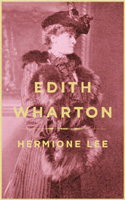home | metro silicon valley index | the arts | books | review

Edith Wharton
(By Hermione Lee; Knopf; 869 pages; $35 cloth)
Statuesque, armor-chinned, draped in fur wraps, with a bird-in-flight hat and pet Pekingese under her arms, Edith Wharton cut a formidable figure as a literary grand dame at the peak of her fame. Henry James himself sometimes shuddered at the prospects of one of her whirlwind visits—even as a guest, she tended to dominate conversations and itineraries. Born during the Civil War into a wealthy, respectable Dutch family, Wharton was mostly self-educated, a voracious reader deeply affected by many childhood trips to France. Her career took off late—she didn't publish her first book until she was 35. She became an international bestseller with The House of Mirth and Ethan Frome but was dismissed as an old-fashioned novelist by the time she died, in 1937. With her most familiar tales (Mirth, The Age of Innocence, Old New York) set in the class-bound upper reaches of New York society in the 1870s, Wharton seems more like a Victorian than a modernist, although she was asked to translate Proust, met F. Scott Fitzgerald and hobnobbed with Jean Cocteau. In her compendious yet highly readable brick of a biography, Hermione Lee does an admirable job of resurrecting Wharton's reputation, pointing out how withering, how scarifying, how "modern" her novels and stories could be. With a keen eye, Wharton dissects the materialistic constraints of New York society, "a way of life defined by its architecture, interior design, clothes, fixtures and fittings." Her characters push against these constraints, emotions and intellectual desires, but in the end, "To feel utterly alienated from the standard rituals of behaviour in which one is also participating is the fate of most of Wharton's thinking characters." For many of Wharton's characters, Lee writes, "there is a feeling of being stuck inside a dilemma from which there is no exit"—shades of Sartre. At times, Lee's Wharton comes across as a closet Marxist; in The Custom of the Country, "No place in American society and politics [is] uncorrupted by the exploitation and expansionism of American corporate culture." In addition to inspiring readers to dip into Wharton's writings anew (especially her substantial body of short stories), Lee provides a rich portrait of the author's life: her troubled marriage to mentally unstable Teddy Wharton, from which, like one of her characters, she could not extract herself for many years; her midlife affair with "Frenchified" American journalist William Morton Fullerton; her Mr. Toad-like enthusiasm for motorcars; her many literary friendships; her devotion to her adopted country, France; her sumptuous country gardens. Wharton could be both a gracious hostess and a royal pain; Macmillan, one of her publishers, "received streams of letters from her about the need for extensive advertising and larger advances, fierce complaints about misprints and punctuation ..." A penetrating critic of snobbery in others, she could be a snob herself; as the years progressed, she freely expressed anti-Semitic opinions. Lee reminds us, also, of how much this cosseted woman from a rich, hidebound family, who married young and in error, endured before she found her voice and, in her own words, "groped my way through to my vocation ... The Land of Letters was henceforth to be my country, and I gloried in my new citizenship."
Review by Michael S. Gant
Send a letter to the editor about this story.
|
|
|
|
|
|